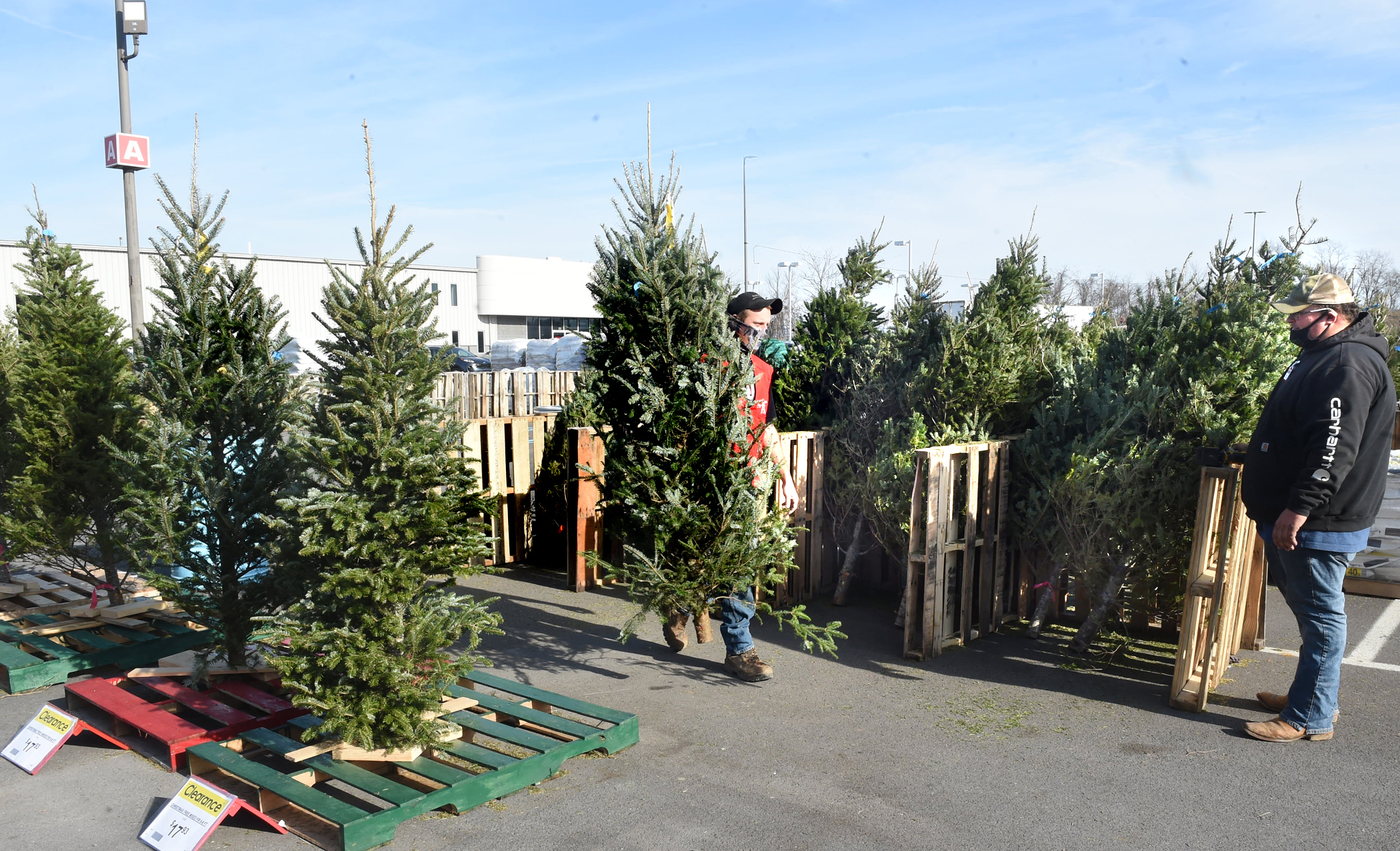Many opt for big retail stores or local tree farms
Drive around the Morgantown area this holiday season and you’ll notice something is missing.
Yes, West Virginia University students are on break.
But it’s something else. The number of pop-up, mom-and-pop Christmas tree lots, once a common sight between Thanksgiving and Christmas, has dwindled. Tree lots normally found on either side of Monongahela Boulevard, for instance, are no longer there.
Why? The answer is two-fold. Big-box retailers such as Home Depot, Lowe’s and Walmart now sell trees and often at a lower price than the corner lot. Plus, Millennials — those born between 1981 and 1996 — are now having children and want to have the experience of going to a tree farm and picking out their own tree.
And strangely, COVID-19 has not factored into the trend, said Doug Hundley, a spokesman for the National Christmas Tree Association, a Littleton, Colo.-based trade association.
“It caused people to put up their trees earlier,” he said.
According the NCTA, based on its January survey of the 2019 selling season, 26.2 million real trees were purchased with
32% coming from choose-and-cut farms and 24% coming from chain retailers. Retail lots accounted for 17% of the sales.
“We have been home because of COVID,” Hundley said. “We are ready to start celebrating Christmas and a lot of people are coming back to real trees.”
“Well-established retailers have survived,” he said. “Temporary or part-time retailers have found it difficult to compete.” Also many service-oriented organizations no longer sell trees as fundraisers.
Lea and Kyle Marhefka of Morgantown, both in their late 20s, recently bought a tree from Quarter Pine Tree Farm in nearby Smithfield, Pa. They even took their basset hound Chuck with them and made a day out of it.
“COVID didn’t play a factor for us,” Lea said. “We were going to get a real tree anyway, but it did provide us with another outdoor, socially distanced activity to participate in. Kyle and I both grew up with our parents getting real trees every year. It’s one of our favorite Christmas memories and a tradition we want to keep with us.
“We love the smell and the look is more authentic. It feels more like Christmas,” said Lea, adding that Chuck enjoyed himself too.
“Lots of scents,” she said.
Other area tree farms such as King’s Trees in Bruceton Mills, which has been growing and selling trees for more than 70 years, sell around 400 trees a year to people not only in Morgantown, but as far away as Pittsburgh, and even Charleston.
The COVID-19 factor
Hundley said the association — concerned about the impact of COVID-19 on the selling season — developed safety measures for tree sellers over the summer so people could buy without fear of getting COVID-19.
“All real Christmas trees are sold outdoors,” he said. “Generally speaking, it’s not unsafe.”
NCTA recommendations for retail lots included social distancing, separate entrances and exits, one-way foot traffic, as well as having hand sanitizers and providing personal protection equipment for lot workers. Other suggestions included placing physical barriers between the cashier and customer, as well as online ordering and delivery.
For choose-and-cut farms, the NCTA suggested frequent sanitization of common areas, the wearing of masks and neck gaiters, and having signs saying ownership has the right not to serve someone showing signs of an illness. The association also suggested having special hours for the elderly and other at-risk customers.
“We want to keep people as safe as possible,” Hundley said.
A local retailer’s perspective
West Virginia harvested 42,830 trees in 2017, according to the most recent statistics from the U.S. Department of Agriculture, putting the state in the top 25. Oregon topped the list with 4.71 million trees followed by New York state with 4 million and Michigan with 1.5 million. It takes five to seven years for a tree to mature.
The NCTA said the most popular tree purchased is the balsam fir. Other popular brands include the Douglas fir, the Fraser fir, the Scotch pine and the Colorado blue spruce.
Mallory Moholt of Morgantown is selling Christmas trees this year in an empty lot behind Sheetz on Grafton Road, a stone’s throw from a Walmart. She is in the lot from 10 a.m. to 7 p.m. and stays warm by sitting in the cab of her pickup truck.
“Come support your local business,” said Moholt, adding business has been kind of slow so far. “It’s been hard (selling trees) with the big chains.”
She is selling spruce trees from Mozark Tree Farm in Tucker County for $37, nearly $40 less than the average tree price in 2019 of $76.87, according to the NCTA. Sheen also offers tree delivery for buyers.
“It’s been a great experience,” said Moholt. (She ran out of trees Dec. 10 and plans to return to the same location next year.)
The NCTA said before putting up a tree, make sure about an inch is removed from the trunk to ensure water absorption. Plus, water levels should be checked daily. Also, don’t put the tree near an open fire place or heater.
Around 95 million homes will have a tree this year, NCTA said. Around 75% of the homes, however, will have an artificial tree.
Ashley Flamm, a Morgantown doctor, said she has no plans to buy a real tree. It’s not because she is not in the holiday spirit. She is.
“I’m so back-and-forth between home and the hospital that it’s a major factor to not worry about watering it or cleaning up needles,” she said. “It’s also low-hassle in that I can put it up early and enjoy the lights for several weeks without concern for it dying, drying out, needing to be thrown away.
“Simply stated, it’s just easier.”
Tweet @41Suzanne




